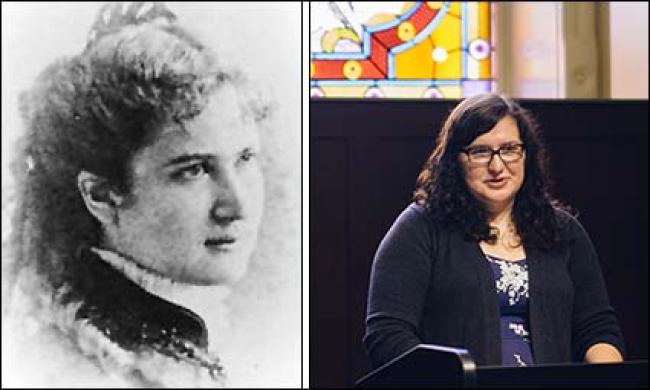Students discover history of local writers
English majors tend to enjoy reading and writing, many appreciate literary research, and most like actual books — the kind with inked words on bound pages. Some take it further by putting themselves into an author's place, living where that writer lived and worked.
Sharing a sense of place, they understand some of the writer's context without going back in time. This was the experience of students working on their Senior Inquiry projects in Dr. Meg Gillette's second-term seminar, The Tri-Cities Renaissance.
The Tri-Cities was the Quad Cities in the modernist period of the late 19th and early 20th centuries, before neighboring Moline became the fourth. At that time, some of the most important writers in America lived and wrote here: including poet Arthur Davison Ficke, leftist fiction writer Floyd Dell, Newberry Award-winning children's author Cornelia Meigs, and Pulitzer Prize-winning playwright Susan Glaspell.
Today, few people know their names.
To bring attention to this neglected body of literature, students researched and wrote essays about the lives and reputations of various Tri-Cities writers. Each essay introduced a selection by the author, and together they formed the chapters of an anthology published by Augustana's own East Hall Press.
A local-color writer of national scale

Elizabeth O'Hara gives her Senior Inquiry presentation. At left her subject, writer Alice French, a.k.a. Octave Thanet, as a young woman.
Senior Elizabeth O'Hara knew she wanted to focus on a woman author. She also wanted to explore the topic of "local color" in depth.
O'Hara discovered Alice French, a.k.a. Octave Thanet, for a while the highest-paid woman writer in America. "Her influence on literature in her time is undeniable," O'Hara wrote in "Her Lorelei: Alice French."
"At first, I only thought of her as a local color author," she admitted. "But after learning about her background and family, I knew better."
O'Hara describes local color as a way of "painting the picture" of a location so that readers and potential visitors can admire it from the outside. This differs from regionalist writing, which presents an interior view of the life of a place. Considering French a regionalist in many ways, O'Hara wrote that the women regionalists "have been neglected by historians, who lumped the women writers together with male local color writers....."
"The literary scene at the time was changing, so eventually what French was writing was not as popular. She was at the beginning of the trend towards Modernism, and was left behind a bit," O'Hara said.
"In one article, I read that toward the end of her life she talked about her discomfort with ‘the new woman' and the progress being made."
To create a future, dig into the past
In learning so much about Alice French and other regionalist writers, O'Hara also learned that she really liked to do research. "I searched lots of primary sources, online newspaper databases in the Davenport library and at Augustana.
"That was my favorite part," she said. "I liked putting her whole life story together: I'd get deep into a database and see an article on her, and then a month later, her response."
A student worker in Augustana's Tredway Library, O'Hara now is interested in pursuing library science as a career.
Standing where French stood brought it home, too. One day, Dr. Gillette took the class on a field trip of locations significant to the writers they chose — including residences for French, Glaspell, Dell, Ficke, and an historical marker of the site of Fort McClellan. In 1862, Dakota Indians imprisoned at the fort wrote letters only recently translated into English.
O'Hara said most of the 11 students were able to find original locations for their chosen writer.
Their Senior Inquiry essays are published in "The Stories We Tell: Modernism in the Tri-Cities." Contributing writers Carrie Reitz '14 and Alexandria Petrassi '14 also acted as assistant editor and proofreader for the book. All the students gave a public presentation on their work in the Forum of Old Main during the 2014 Celebration of Learning.
O'Hara said it feels strange to have it all in solid book form. "We had been working on it for quite a while, so it's nice to see it printed. My mom keeps showing it to everybody."
"The Stories We Tell" is available at libraries throughout the Quad Cities.
About East Hall Press
Students interested in careers in publishing and editing enjoy at Augustana what students at many private liberal arts colleges do not: the chance to work and learn with a publishing company on their own campus. East Hall Press has been in operation since 1969. As a niche press, East Hall publishes works of local interest — specifically works about the Midwest, the Quad Cities and the Mississippi River, and works by local poets and writers (both fiction and nonfiction).
Students in the 400-level publishing class work on the books. Many have gone on to careers in editing and publishing, and some have found further training at the graduate level at places such as the University of Denver Publishing Institute.
